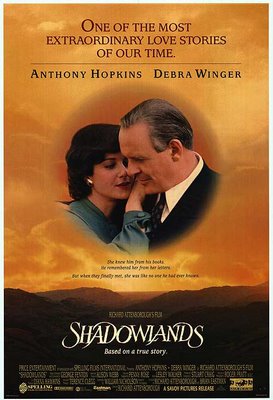
SHADOWLANDS
UK, 1993, 131 minutes, Colour.
Anthony Hopkins, Debra Winger, John Wood, Edward Hardwicke, Joseph Mazzello, Peter Firth.
Directed by Richard Attenborough
C.S.Lewis, known as Jack, is a bachelor Oxford don, a Professor of English but well-known for his children's fables, the Narnia tales. He is also known as a writer and broadcaster. He lives a comparatively reclusive and academic life. He receives a letter from an American poet, Joy Gresham. She and her son, Douglas, visit Oxford and he invites them to enjoy Christmas with him and his brother. Douglas does not enjoy the visit. They return to the US where Joy divorces her husband.
She later returns to England and attends one of Lewis's lectures on Christianity. Lewis agrees to a marriage of convenience to enable her to stay in England. She stirs the quietly complacent life of the dons.
When Joy collapses, she is diagnosed with cancer. Lewis goes every day to London to see her and gradually realises he loves her. He proposes to Joy and they are married 'before God' by a vicar in the hospital. They later go on a honeymoon trip to the Golden Valley. However, on their return, Joy goes back to hospital where she dies. Lewis is distraught but gradually returns to his university life and gets support from Douglas.
Shadowlands has come to the big screen from an initial telemovie, written by William Nicholson, starring Joss Ackland and Claire Bloom as Lewis and Joy. Nicholson then adapted the movie for the stage where it was an award-winning play for Nigel Hawthorne. Finally, Nicholson adapted it yet again for director, Richard Attenborough (Gandhi, Cry Freedom, Chaplin, A Chorus Line).
Anthony Hopkins gives a finely nuanced performance as Lewis. Attenborough creates the atmosphere of Oxford in the 50s and 60s with an eye to detail.
Hopkins' performance highlights the don who is almost a recluse, comfortable in bachelor digs with his brother, Warnie (Edward Hardwicke). He comes alive during academic discussions in the dining hall or in the pub.
He enjoys tutorials but is demanding on students. Expert on the tradition of courtly love, he has also written such children's books. He also searches in literature to penetrate something of the mystery of God in the experience of suffering. Hopkins' portrayal of a comfortable celibate attracted to his opposite type is beautifully restrained emotional acting, matched by the American vigour and vulnerability of Debra Winger as Joy.
1.The appeal of the biography of C.S. Lewis? Richard Attenborough and his admiration for Lewis, seeing Lewis as a great man, author, scholar? The humanising of C.S. Lewis?
2.Lewis and his reputation, his Irish background, religious background? His work as a don? His academic skills, the tutorials? His explanation of Courtly Love? His reputation for writing The Narnia Chronicles? His being looked down on this by his fellow dons? The biography of Lewis as British, as human, as religious?
3.The title, Lewis’s own experience, Joy Gresham and her death experience? The shadow lands of suffering leading to the bright lands of happiness? Lewis’s perspective on Joy? (His semi-autobiographical book about this period in his life with Wordsworth’s title and its ambiguity, Surprised by Joy.) The journey from an intellectual scholar to an emotional man?
4.Lewis and his relationship with his brother, their sharing digs? The details of the scholar’s life in Oxford? The life of the dons, the bachelor world? The colleges and rooms? The dining room? The tutorials? The conversation between the dons – intellectual? Lewis and his tutorial groups and individuals? The life in the pub, the experience of the intrusion of the American, the loud Joy? The transition to Joy’s house? The travel sequences and the hotel? The hospitals and Joy’s illness? A shadow lands world?
5.The introduction to Lewis, his character, his experience, his brother, the lectures, the students, the staff? His being very proper? His writings? His religious discourse and lectures? A man of culture?
6.The portrait of Warnie, his relationship with his brother? The characterisation of the other dons, their style, discussions? Ironical sense of humour? A secluded group?
7.Joy Gresham, her American background, her son Douglas? Her violent husband, alcoholic, separated? Her writing to Lewis, coming to England with Douglas? Trying to find him? Her coming to the hotel, calling out for someone called Lewis? Her brashness and the contrast with Lewis? Lewis and his befriending Joy, befriending Douglas? Their celebration of Christmas and his human touch? Their return to the United States?
8.Joy and her return to England, the divorce? Her presence in the lecture? The effect on Lewis? His meeting her again, his decision to go through a form of marriage to give her British citizenship? The perfunctory ceremony and Lewis’s attitude towards it? Not really a marriage in the eyes of God? Their time together? Douglas and his being at home, friendship with Warney? His disappointment about the cupboard – expecting Narnia behind it? The bonds? The love? Joy’s collapse?
9.Joy’s illness, the hospitalisation, Lewis and his going from Oxford to London each day to see her? The effect on him? His decision to marry her, the ceremony? Her return to the house? The painting and the scenery in Herefordshire? The decision to go on a trip – the joy of the countryside, the exhilaration of the honeymoon? In the hotel – and the humour of the room service episode and Lewis’s going into panic in ringing room service?
10.Joy and the return to hospital, her preparation for death, the sadness of her death? The consequences for Douglas?
11.The upbeat ending, the moving out of shadow lands? The sharing between Lewis and Douglas? The bonding? The future together – and the tour? The aftermath and Douglas Gresham’s loyalty over the decades to the memory on Lewis and to his literature?
12.A well-made film, dignified, moving, emotional – and a touch manipulative perhaps?